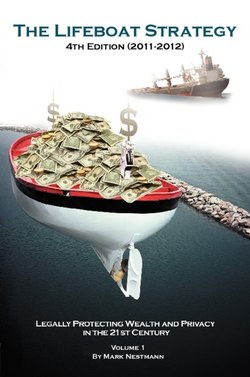Читать книгу THE LIFEBOAT STRATEGY - Mark Nestmann - Страница 6
На сайте Литреса книга снята с продажи.
50,000 Lawsuits, Each Day
ОглавлениеBattles waged in U.S. courtrooms over divorces, wills and other money matters are proliferating. More than 80% of the world’s lawyers practice in the United States. Over 50,000 lawsuits are filed every day in the United States.2 Each year, the “tort system” costs the U.S. economy nearly $1 trillion.3
Virtually any type of disagreement may lead to a lawsuit. Disputes that may lead to lawsuits include divorce, dissolution of a business, and disagreements among relatives following the death of wealthy family member. Tort litigation—a lawsuit filed over a perceived injury—is also common. Professionals— doctors, lawyers, engineers, etc.—are frequent targets of tort litigation. If someone is injured on your property, or because of an accident you cause in a vehicle you’re driving, you may be sued for a tort claim.
One reason that lawsuits are so prevalent in the United States is that unlike most other countries, U.S. lawyers can take cases on “contingency.” The attorney receives no fees unless money is recovered from the defendant. As a result, those with chips on their shoulders can sue you, and risk nothing more than time and energy. Companies have now been formed to invest in selected U.S. lawsuits by buying a share of the settlement based on the merits of the case. Web sites like http://www.whocanisue.com match prospective litigants to attorneys willing to take their case.
Another factor encouraging civil litigation is the growing number of federal and state laws that give plaintiffs a cause of action to recover damages against employers, landlords, and other businesses. Some of the most important of these laws are the Americans with Disabilities Act4, the Fair Credit Reporting Act5, and the Racketeer Influenced and Corrupt Organizations Act6, but there are many others.
Poor economic conditions also encourage lawsuits. People sue because they’re angry, desperate, or think they can get some easy money from a deep pocket. In a severe economic downturn, there’s plenty of anger and desperation. Since the current recession began in 2007, lawyers have filed a blizzard of lawsuits connected to investment losses, worker layoffs, foreclosures, and abandoned property.7
Lawsuits are privacy destroyers. Information disclosed in a lawsuit is usually a matter of public record. And through the judicial process, a plaintiff (the person suing) is entitled to use a compulsory legal document called a subpoena to obtain books, records, and other documents. You (and your opponent) can subpoena many types of records, including banking and brokerage transactions, computer records, utility records, and closed circuit television records, just to name a few. Some documents are subject to greater protection—medical records and the content of e-mail messages, but there are many ways to get the information.8
This process is called “discovery.” If you refuse to cooperate, the court can compel discovery with fines and even arrest. If you lie, and are later found out, you may be charged with perjury, a criminal offense. You may not refuse to answer the questions, unless there is a possibility of criminal prosecution.
Think you can count on the judge in a lawsuit to be “fair?” Then consider this quote from former West Virginia Supreme Court Justice Richard Neely:
As long as I am allowed to redistribute wealth from out-of-state companies to injured in-state plaintiffs, I shall continue to do so. Not only is my sleep enhanced when I give someone else’s money away, but so is my job security, because in-state plaintiffs, their families, and their friends will re-elect me. It should be obvious that the in-state local plaintiff, his witnesses, and his friends, can all vote for the judge, while the out-of-state defendant can’t even be relied upon to send a campaign donation.9
